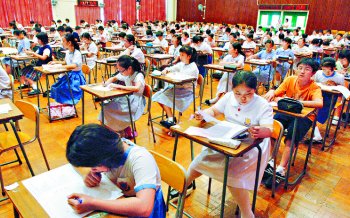News and Events
Previously, we discussed the types of Pre-IB bridging courses available in Hong Kong, and the importance of choosing the most suitable in consolidating a solid foundation for the International Baccalaureate Diploma Program. In this article, we will focus on the IB's self-curated Pre-IB course- the Middle Years Program.
The IBMYP was developed with the aim to create "creative, critical and reflective learners," whilst developing conceptual understanding as opposed to memory and cramming based learning.
Its curriculum encourages students to hold five Approaches to Learning: thinking, social, communication, self-management and research.
The main selling point of the MYP is that it is more project- and task-focused than most bridging programs. There is also some freedom regarding the methods of learning and examinations, which may be beneficial to students who are curious about many subjects but do not have a clear preference.
However, the freedom this program offers may prove detrimental to students who are more acclimated to a more organized manner of education.
The curriculum does not follow a strict structure like many local schools - for example, students do not have to partake in many core subjects in comparison to other bridging programs. MYP students are required to maintain independent decision making and inquisitive thinking in order to succeed.
If students lack initiative or intuition in their decision making, or are used to education that is more coddling, for example being spoon-fed information rather than having incentive to research material on their own, they may struggle to adapt at first.
On the other hand, the freedom can benefit students uniquely compared to other bridging programs - most notably, regarding the method of assessment. They may choose to partake in a personal project, which allows them to further explore, examine and master personal or academic areas of interest.
However, if students are more inclined towards examinations, they may instead elect to sit an on-screen examination, and hand in an e-portfolio that could allow students to demonstrate their academic abilities within a familiarized environment.
In comparison to the IGCSE, the difference between the examinations, academic rigor and workload is not large. However, for those who prefer a more structured academic profile, I would recommend the IGCSE.
The next important question is whether the MYP allows students to study their subjects of choice, and whether a wide enough range is available.
All three bridging programs (pre-IB, IGCSE and IBMYP) provide sufficient support in this area. Let's now weigh the differences between each program in relation to course choices.
Firstly, pre-IB programs allow students to experience IB-related materials and topics prior to studying the IBDP, ensuring that students have a headstart in reading for subjects that pique their interest. The programs also offer students opportunities to test out the waters of a subject prior to diving into its depths.
This is important since subject changes can raise educational and logistical challenges for both students and teachers. While subject change is not impossible, it can impede a student's academic progress and motivation to learn.
As for the IGCSE, academic preparation for students goes further than pre-IB programs. It is common for students to study at least six subjects at once - the same as required for the IBDP. However, many ESF students take on as many as eight to 10. Therefore, the educational exposure the IGCSE offers is of an excellent standard.
The MYP offers eight subject groups: language acquisition, language and literature, individuals and societies, sciences, mathematics, arts, design, and physical and health education.
In comparison to the IGCSE, the MYP takes a project-based approach in learning, and does not have a fixed curriculum.
That said, one should not discount the unique method of teaching offered by the MYP, which sheds new insights into the ways in which subjects are interconnected.
For example, within the individuals and societies subject, students will be able explore interdisciplinary topics such as geography and history. Such an experience is rare in secondary school education.
It is important for students to take the bridging leap and find out where their strengths and interests lie. Even if they don't undertake the IBDP, they will still retain a strong transferable educational skill set.
https://www.thestandard.com.hk/section-news/fc/4/252246/Middle-of-the-road




